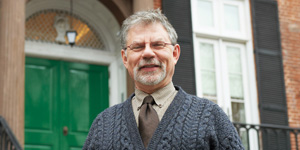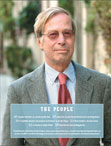A President, Knighted
Printer Friendly VersionOver the past year, when University Professor Joseph Weiler’s proverbial phone rang, it was often Italy calling. Last December, the European University Institute (EUI) in Florence named Weiler its president, a position he assumes in September. And in February, Weiler traveled to Rome to receive two prestigious and rare honors.
Weiler will be on leave for a five-year term as president of the EUI, a doctoral and postdoctoral research institution created by the founding countries of the European Union. The EUI and Weiler are well acquainted. He taught law at the EUI from 1978 to 1985 after earning his PhD there, and later he co-founded its Academy of European Law and a center that is now its Robert Schuman Centre for Advanced Studies. “I am humbled yet gratified to return as president to my alma mater at a time of both great challenge and great promise in Europe,” Weiler said in a statement.
Colleagues say Weiler was a natural pick to be the EUI’s next leader. Florence Ellinwood Allen Professor of Law Gráinne de Búrca, a former EUI professor, says, “It’s difficult to think of a more suitably qualified person than Joseph Weiler. In addition to being one of Europe’s leading intellectuals for over three decades, he has quite remarkable institution-building skills and experience.” At NYU Law, de Búrca notes, he established and directed the Jean Monnet Center for International and Regional Economic Law and Justice, the Straus Institute for the Advanced Study of Law and Justice, and the Tikvah Center for Law and Jewish Civilization. Weiler was also chair and faculty director of the Hauser Global Law School Program and the JSD Program. “He has the creativity, vision, and energy of several people combined,” de Búrca says.
Weiler’s accomplishments outside the halls of academia have also drawn note and appreciation, including from the pope and the president of Italy. Although Weiler is an Orthodox Jew, in 2011 he won a landmark ruling from the Grand Chamber of the European Court of Human Rights upholding Italy’s right to display crucifixes in public classrooms. Weiler, who took the case pro bono, explained that it was mostly about the right of European states to chart different approaches to the relationship of church and state—the right of “France to be France and Italy to be Italy,” resisting, as he said in his oral pleadings, a “one rule fits all” solution to this delicate issue.
At the end of January, Pope Benedict XVI honored Weiler with an audience at the Vatican. Later, at a dinner on the same day, at the official residence of Italy’s President Giorgio Napolitano, Weiler was made a Knight Grand Cross of the Order of Merit of the Italian Republic, Italy’s highest civilian honor. He shares the rank with dignitaries from around the world including Prince Philip, Queen Sofía of Spain, and Supreme Court Justice Samuel Alito Jr.
Even as Weiler settles into his new position at the EUI in Florence, he will retain ties to NYU Law, serving on a range of committees related to programs he has overseen. His phone will no doubt continue to ring, but now many of the calls may come from Washington Square.
—

